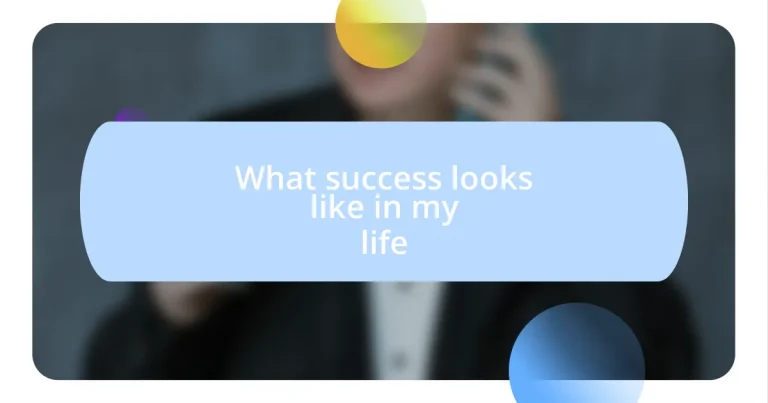Key takeaways:
- Personal success is defined by individual experiences and values, focusing on fulfillment rather than traditional milestones.
- Identifying core values guides decision-making and helps create an authentic definition of success.
- Setting achievable goals with specific, measurable, and realistic criteria promotes manageable progress and motivation.
- Celebrating small victories and adapting plans enhances motivation, accountability, and the overall experience of success.
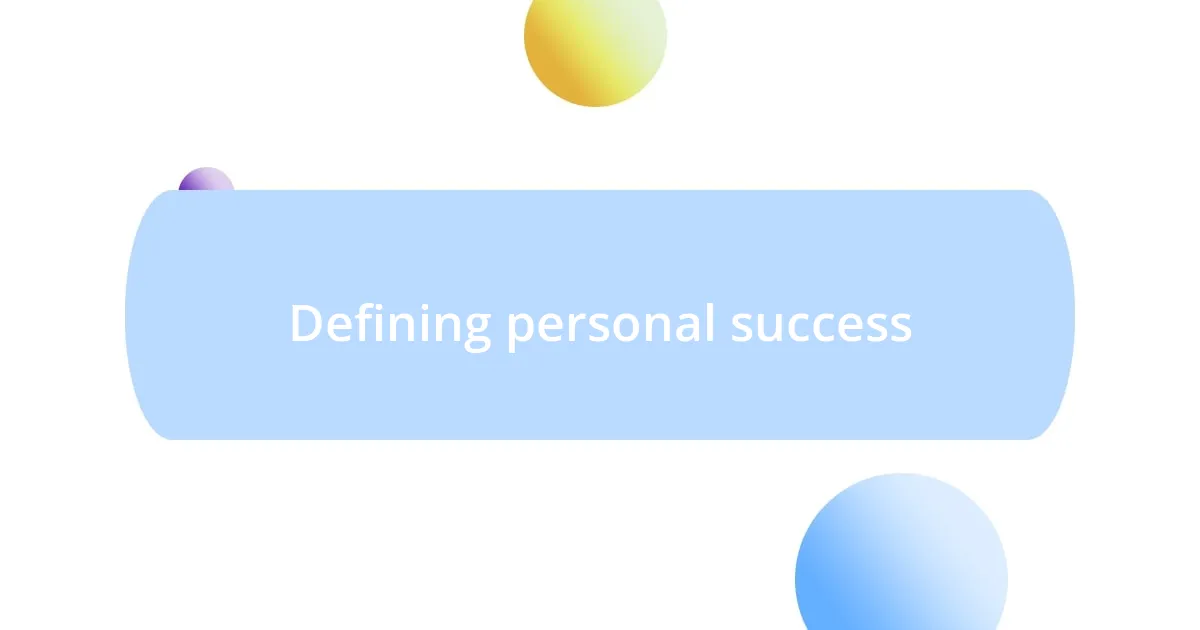
Defining personal success
Defining personal success is an intimate journey, often shaped by our unique experiences and values. For me, it means not just achieving my goals but also finding joy in the process. I remember a time when I worked tirelessly on a project, and the satisfaction I felt when I completed it was worth more than any recognition.
I’ve learned that success isn’t always measured by traditional milestones like promotions or accolades. Sometimes, it’s as simple as feeling fulfilled in my daily life. Have you ever paused to appreciate the little victories, like having a heartfelt conversation or taking the time to enjoy a hobby? Those moments profoundly contribute to my sense of success.
Moreover, I believe that personal success evolves with time. What felt like a major accomplishment in my twenties, like starting my own business, shifted as family and personal wellbeing took precedence. Isn’t it important to revisit our definitions of success regularly? Recognizing that our priorities change helps us create a version of success that feels authentic and aligns with who we are at each stage of our lives.

Identifying core values
Identifying core values is essential in shaping my definition of success. I recall a time when I had to choose between a high-paying job and one that aligned with my passion for community service. Ultimately, I chose the latter, realizing that being true to my core values not only brought me joy but also motivated me to excel in my work. Have you ever faced a similar choice that highlighted what truly matters to you?
Reflecting on my core values helps clarify my priorities. For instance, integrity has always been a guiding principle for me. When I was tempted to cut corners to meet a deadline, I chose to uphold my standards, even if it meant disappointing others temporarily. It’s in these moments that I learn the importance of staying connected to what I believe in, which ultimately influences my idea of success.
To deepen my understanding of my core values, I often create a comparison between different aspects of my life. This visual representation helps me assess whether I’m living authentically. When values like creativity and family are at the forefront, decisions become clearer, leading me toward a more fulfilling life. Exploring how these values align in various roles—like a friend, parent, or professional—not only grounds me but enhances my overall sense of success.
| Core Values | Importance in My Life |
|---|---|
| Integrity | Guides my decisions and fosters trust |
| Creativity | Encourages innovative thinking and personal expression |
| Community | Connects me with others and creates a sense of belonging |
| Well-being | Prioritizes mental and physical health for overall success |
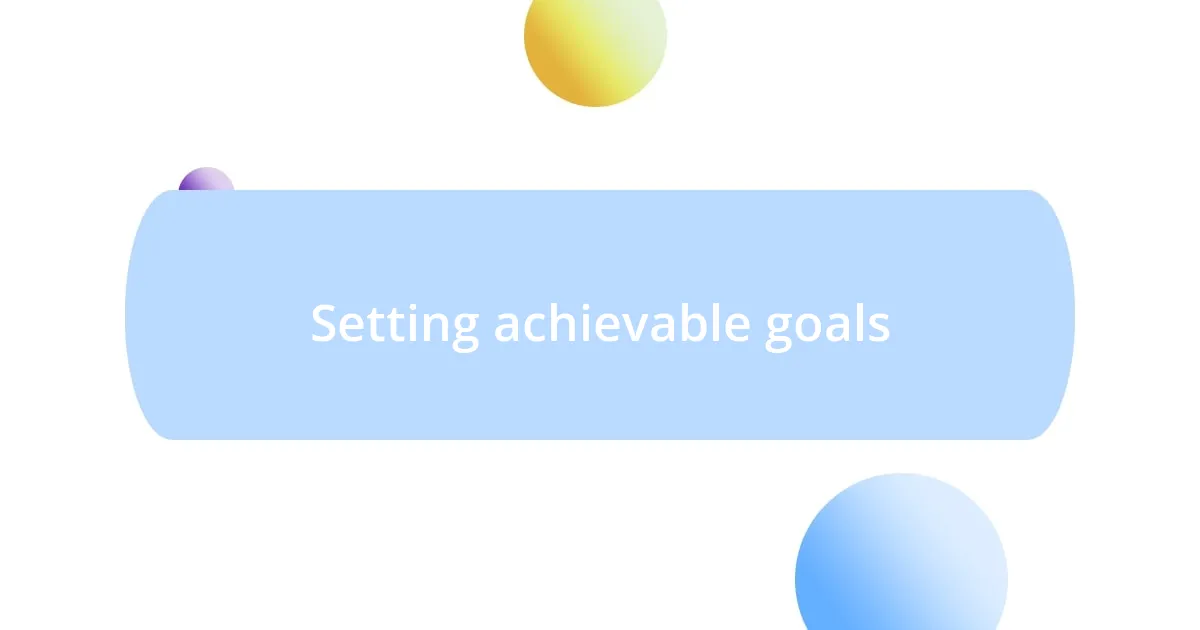
Setting achievable goals
Setting achievable goals begins with understanding what is realistic and meaningful for each of us. I recall a period in my life when I aimed too high without considering the necessary steps. It wasn’t until I broke my goals into smaller, manageable tasks that I began to see tangible progress. For instance, while training for a marathon seemed daunting, setting milestones like jogging a few miles at a time transformed my approach. This incremental progress kept me motivated and committed.
When setting your goals, consider these key strategies:
- Be specific: Define what success looks like for you in concrete terms.
- Make them measurable: Aim for goals you can track to gauge your progress.
- Stay realistic: Ensure your goals are achievable given your current circumstances.
- Set a timeframe: Assign deadlines to create urgency and keep yourself accountable.
By aligning my goals with my values and personal realities, I’ve found the journey to success feels much less overwhelming. Celebrating even the small accomplishments along the way fosters a sense of achievement that fuels my motivation further.
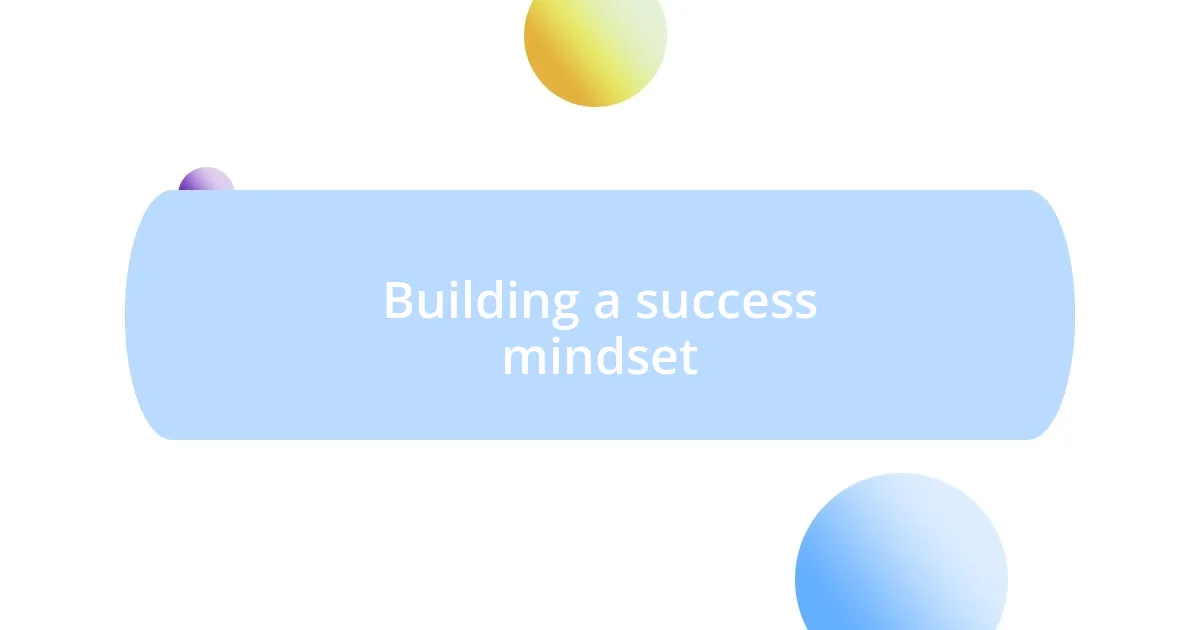
Building a success mindset
Building a success mindset starts with cultivating a positive inner dialogue. I remember a time in my early career when self-doubt crept in every time I faced a challenge. A mentor advised me to transform those negative thoughts into questions like, “What can I learn from this?” or “How can I overcome this obstacle?” That simple shift opened the door to growth and resilience, allowing me to tackle difficulties with a proactive attitude. Have you ever caught yourself thinking negatively? How might reframing those thoughts change your perspective?
Embracing a growth mindset also plays a crucial role in building success. I once took a public speaking course, terrified of addressing an audience. Each time I stepped onto the stage, I felt my heart race. Yet, I realized that making mistakes was part of the learning process. I began seeing my audience not as critics, but as fellow learners. This shift empowered me, turning my fear into a thrilling opportunity for growth. How often do we hold ourselves back because we fear failure instead of recognizing it as a stepping stone?
Consistency is another vital aspect of a success mindset. I strive to engage in daily practices that reinforce my goals and beliefs. Whether it’s journaling my thoughts or dedicating time to meditation, these small rituals cultivate a sense of purpose and focus. I’ve often found that on particularly busy days, returning to these grounding activities provides clarity and keeps me aligned with my vision of success. What practices do you find help you remain grounded and focused amidst life’s chaos?
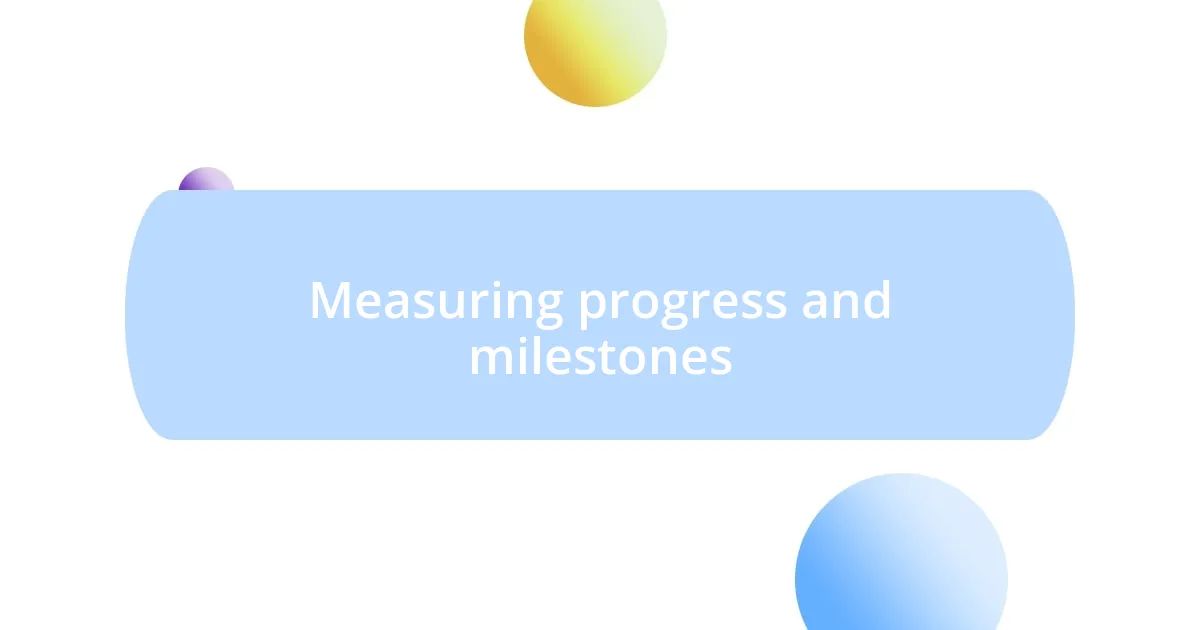
Measuring progress and milestones
Measuring progress and milestones is an essential part of any journey toward success. I remember a pivotal moment when I decided to track my daily achievements in a journal. At first, it felt like just another task on my to-do list, but as the entries piled up, I was surprised by how motivated I felt. Seeing even the smallest accomplishments written down made them feel tangible. It’s incredible how a simple act like this can illuminate the path forward, right?
One effective way I’ve measured progress is by celebrating milestones, no matter how small. When I completed the first week of my workout regimen, I treated myself to a favorite meal. This practice not only reinforced my commitment but also reminded me that success isn’t always about the finish line—it’s the little victories that build momentum. Have you ever noticed how rewarding it feels to acknowledge your own hard work?
Another strategy has been setting regular check-ins with myself. Every month, I take time to reflect on what I’ve achieved and where I need to adjust my goals. It’s like having a personal coach—just me, assessing my journey without judgment. I’ve found that these self-reflections fuel my motivation and provide clarity, almost like shining a flashlight on areas that need more attention. So, how often do you take a moment to pause and evaluate your own progress? It might just be the key to unlocking your next breakthrough.
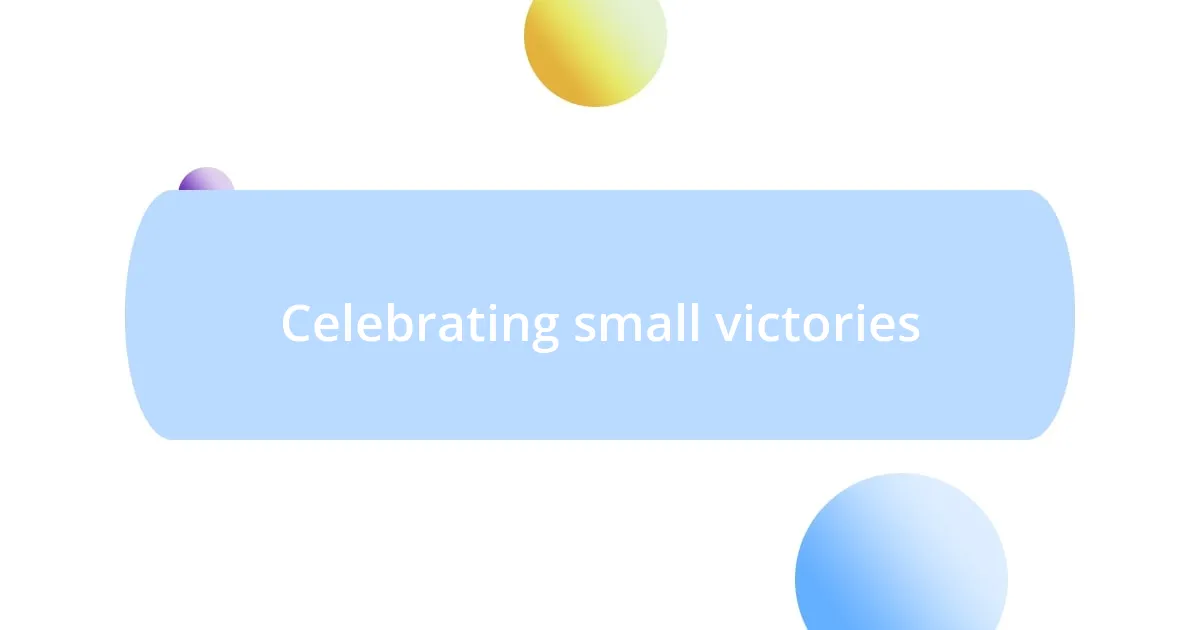
Celebrating small victories
Celebrating small victories can transform the way we view our progress. I vividly remember the time I finished reading a challenging book. Instead of waiting until I completed my reading list, I decided to reward myself with a cozy evening and my favorite dessert. That little celebration made me appreciate the incremental steps I was taking, rather than just fixating on the bigger picture. Have you ever felt that rush of satisfaction from acknowledging a small win?
It’s fascinating how these tiny celebrations can fuel our motivation. I found it especially impactful during my weight loss journey. Each week, when I reached a mini-goal like drinking enough water or exercising a few extra minutes, I’d treat myself to a movie night. These small victories boosted my morale and created a positive reinforcement loop that kept me going. Reflecting on those moments, I wonder—what can your small victories teach you about enjoyment in your journey?
I believe celebrating isn’t just about rewards; it’s about recognition and mindfulness. For instance, after completing a particularly tough work project, I took a moment to reflect on the effort it required. I shared my achievement with friends, who cheered me on. Their enthusiasm reaffirmed my commitment and helped solidify that moment of success. It makes me think, how often do we take the time to share our achievements with others? That acknowledgment can amplify the joy and significance of our wins, no matter how minor they seem.
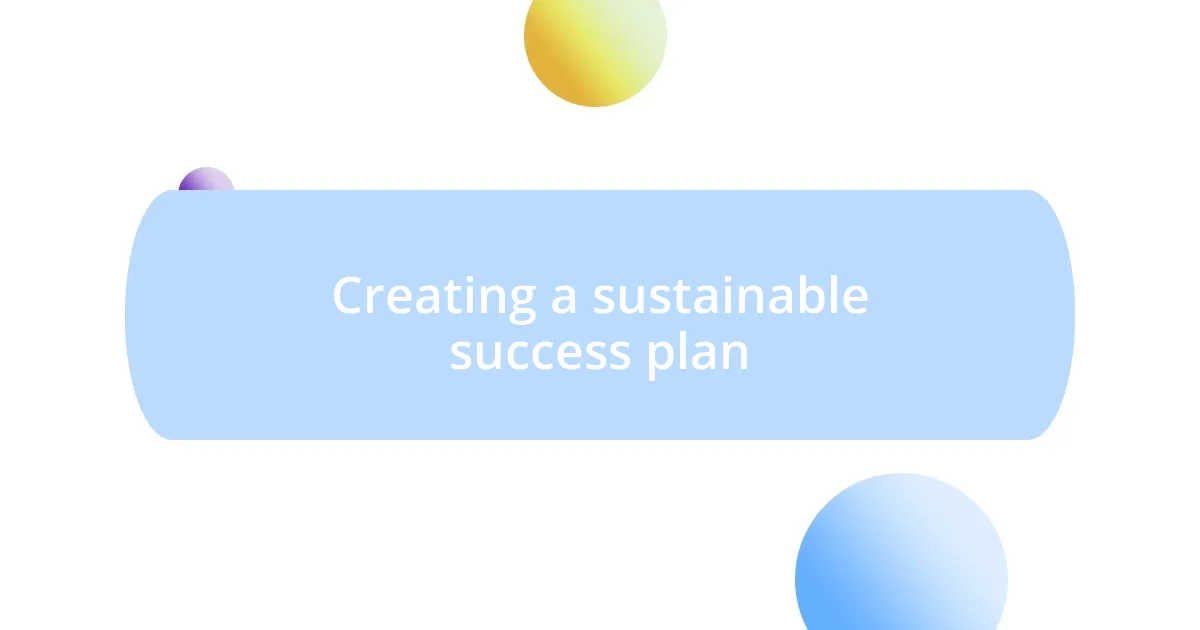
Creating a sustainable success plan
Creating a sustainable success plan starts with clear goals. A few years ago, I found myself overwhelmed by ambitions that lacked structure. To tackle this, I spent an afternoon brainstorming and breaking down my larger dreams into smaller, actionable steps. It’s incredible how defining those individual tasks breathed life into my aspirations. Have you ever felt that relief when you finally put what’s in your mind onto paper?
Next, I’ve learned the importance of adaptability in my plans. When I first set out to meet my fitness goals, I faced setbacks—life sometimes throws curveballs our way. Instead of rigidly sticking to my original plans, I adjusted them based on my experiences and challenges. This flexibility not only eased my frustration but also kept me moving forward. How do you adapt when life doesn’t go according to plan? It can make all the difference in maintaining momentum.
Lastly, I’ve discovered that accountability plays a crucial role in my success journey. For instance, I once partnered with a friend to share our weekly goals, and we checked in every Friday. Knowing that someone else was aware of my plans kept me focused and committed. I started seeing my journey as a shared adventure rather than a solitary task. Have you found an accountability buddy that helps you stay on track? There’s something powerful about knowing you’re in it together!












